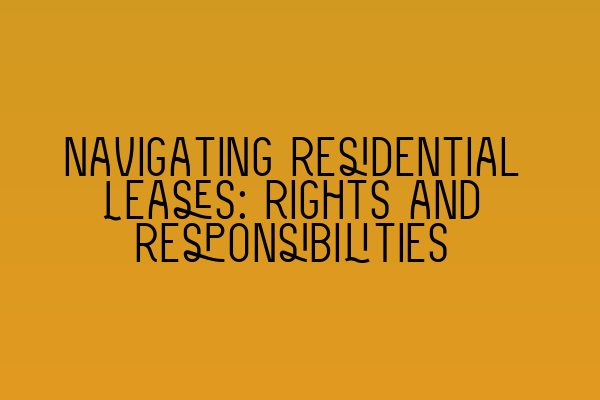Navigating Residential Leases: Rights and Responsibilities
Welcome to the SQE Property Law & Land Law blog, where we provide valuable insights and expert advice on various aspects of property law. In this article, we will be discussing the rights and responsibilities of tenants and landlords when navigating residential leases. Understanding these key elements is essential for both tenants and landlords to ensure a smooth and mutually beneficial leasing experience.
1. Understanding the Lease Agreement
Before entering into a residential lease, it is crucial to thoroughly read and understand the lease agreement. The lease agreement is a legally binding document that outlines the terms and conditions of the tenancy. It typically covers important aspects such as the duration of the lease, rent amount, payment terms, and any restrictions or obligations imposed on both parties.
To gain a better understanding of lease agreements, it is recommended to seek professional legal advice. A property law solicitor can review the document and explain any unclear or complex clauses. The solicitor can also ensure that the lease agreement complies with the latest UK property laws.
2. Tenant Rights and Responsibilities
Tenants have certain rights that are protected by law. These rights include the right to live in a safe and habitable property, the right to peaceful enjoyment of the premises, and the right to privacy. It is important for tenants to be aware of these rights and to assert them if necessary.
Alongside their rights, tenants also have responsibilities. These responsibilities typically include paying rent on time, maintaining the property in a reasonable condition, and notifying the landlord of any maintenance or repair issues promptly. Tenants should also adhere to any additional obligations stated in the lease agreement, such as restrictions on pet ownership or the prohibition of alterations to the property without prior consent.
For a comprehensive guide on navigating lease laws in the UK, refer to our article on Navigating Lease Laws in the UK: Essential Guidelines for Tenants and Landlords.
3. Landlord Rights and Responsibilities
Landlords also have certain rights and responsibilities when it comes to residential leases. These rights include the right to collect rent, the right to inspect the property with proper notice, and the right to enforce lease terms if the tenant fails to comply.
Alongside their rights, landlords have responsibilities towards their tenants. These responsibilities typically include providing a safe and habitable dwelling, making necessary repairs and maintenance, and safeguarding the tenant’s security deposit. It is important for landlords to understand and fulfill these responsibilities to ensure a positive landlord-tenant relationship.
4. Resolving Disputes
Despite the best intentions, disputes can sometimes arise between tenants and landlords. Common areas of dispute include issues related to repairs and maintenance, rent increases, and the return of security deposits. In such cases, it is advisable to first attempt to resolve the matter through open and constructive communication.
If a dispute cannot be resolved amicably, legal action may be necessary. Seeking legal advice from a property law solicitor is crucial to understanding your options and ensuring your rights are protected. Our article on Legal challenges in property transactions: A comprehensive guide provides further insights into resolving property-related disputes.
Conclusion
Navigating residential leases involves a careful understanding of the rights and responsibilities of both tenants and landlords. By familiarizing yourself with the lease agreement, knowing your rights, and fulfilling your obligations, you can ensure a harmonious and mutually beneficial leasing experience.
For more information on property law, SQE preparation, and updates in UK property laws, we highly recommend checking out the following related articles:
- SQE Preparation for Property Practice: Mapping Out Your Strategy
- Updates in UK Property Laws: Key Changes and Implications
- Legal challenges in property transactions: A comprehensive guide
- Navigating Lease Laws in the UK: Essential Guidelines for Tenants and Landlords
- Dominate Property Law Questions: Avoiding Common Pitfalls
Thank you for reading our blog post. Stay tuned for more valuable insights and updates in property law!
